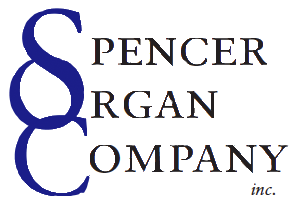Maintenance
Regular maintenance keeps pipe organs working and sounding their best and helps prevent small problems from becoming large, expensive problems. Good service work is both concentrated and minimalist in approach. From the outset we lay solid temperaments and establish proper pitch relationships between divisions. We then work to maintain conditions that encourage stability, and in our service visits exercise sensitive ministrations to promote longevity of both pipes and mechanism.
Our Tuning Process
Aeolian-Skinner Organ at First Congregational Church, Milton, MA
Most of the pipe organs we maintain were built to be tuned to equal temperament at A=440, or in the case of instruments built in the early 20th century, A=435. The pitch of organ pipes varies in a systematic way with temperature, but somewhat differently for reeds and flues, so it is best to tune the instrument at the same temperature as it will be played.
The pitch of organ pipes is generally adjusted by means of collars, slides, scrolls, caps, stoppers or tuning wires. All of these adjustments are affected by daily and seasonal cycles of temperature, which eventually cause the parts to move and the pipe to go out of tune. In wooden pipes, stoppers or slides are also affected by humidity. To prevent damage and to achieve adjustments of as little as a few thousandths of an inch, special tools are used for tuning.
Depending on the condition of the instrument and variations of temperature and humidity within the organ chamber, tuning is usually performed two or more times during the year. One of these may be a full tuning, while the others can often be partial tunings to correct a few notes which have drifted off pitch.
In a full tuning, the pipes of one rank, usually the Great Diapason or equivalent, are tuned individually using a pitch standard. Then the pipes of all the remaining are tuned one by one to match the first rank.
If most of the pipes are already in tune, then a partial tuning can be performed. This is done by first checking and if necessary correcting the tuning of one rank, then testing whether the other ranks are in tune with it. Depending on the number of pipes needing to be tuned, this often takes less than half the time of a full tuning.
Tuning also provides an opportunity to discover and correct other problems, and it is helpful if the organist can provide us with a list of any known problems prior to the tuning.
Maintenance Contracts
In our maintenance work, we usually work to a simple two-page maintenance contract, outlining our and the client’s mutual responsibilities. This is not a contract that binds either party as regards the total amount spent on maintenance in any given period, but merely articulates those conditions under which we work and at what rates. In general, we prefer to bill by the hour for actual time spent. Travel time and mileage expenses are charged. Please feel free to contact us directly to discuss your situation and needs.
Tuning Clients
We maintain over 60 pipe organs throughout New England. Here is a partial list of our ongoing tuning clients.
Massachusetts
All Saint’s Parish, Brookline. Casavant Frères Ltd. Opus 2613, 1961, III/52
Christ Chapel, Centerville. Austin Organs, Inc. Opus 1748, 1930, II/17
Christ Church United, Lowell. Skinner Organ Company Opus 299, 1920, IV/36
Christ Episcopal Church, Needham. Aeolian-Skinner Organ Company, Inc. Opus 1025(A), 1941, IV
Church of the Covenant, Boston. Welte-Trippe Opus 287, 1929, IV/65
The Church of the Holy Name, Swampscott. Skinner Organ Company Opus 368, 1922, III/18
Church of St. Ignatius of Loyola, Chestnut Hill. Casavant Frères Ltd. Opus 1972, 1949/2008, III/26
First Baptist, Hyannis. Aeolian-Skinner Organ Company, Inc. Opus 1271(A), 1953, II/17
First Congregational Church, Milton. Aeolian-Skinner Organ Company, Inc. Opus 914, 1933, II/17
Park Street Church, Boston. Aeolian Skinner Opus 1353, 1957, III/62
Perkins School for the Blind, Watertown. Skinner Organ Company Opus 888, 1932, IV/43
Pilgrim Church of Duxbury, Duxbury. Austin Organs, Inc. Opus 2783, 2003, II/20
Plymouth Church, Congregational, Framingham. Skinner Organ Company Opus 818, 1930, III/29
St. Mary, Star of the Sea Parish, Beverly. Hook & Hastings Co. Opus 2180, 1908, III/37
St. Paul R. C. Church, Cambridge. Originally built by Jesse Woodbury (& Co.) Opus 251, 1904, III/39
Second Church, Newton. Casavant Frères Ltd. Opus 657A, 1987, originally built by Casavant Frères Ltd. Opus 657, 1916, IV/65
United Parish, Brookline. Aeolian-Skinner Organ Company, Inc. Opus 885, 1932, IV/52
New Hampshire
Church of the Good Shepherd, Nashua. Aeolian-Skinner Organ Company, Inc. Opus 1095, 1949, III/26
The Congregational Church of Goffstown. Austin Organs, Inc. Opus 2272, II/15
St. Paul’s School, Concord. Aeolian-Skinner Organ Company, Inc. Opus 825-A, 1952, IV/70
Rhode Island
Central Congregational Church, Providence. Aeolian-Skinner Organ Company, Inc. Opus 1440, 1965, III/58
First Church of Christ, Scientist, Providence. Hutchings-Votey Organ Co. Opus 1637, 1907, III/39
St. Stephen’s Church, Providence. Austin Organs, Inc. Opus 753, III/84
Beyond New England
First United Methodist Church of Oak Park, Oak Park, IL. Skinner Organ Company Opus 528, 1925, IV/44
Longwood Gardens, Kennett Square, PA. Aeolian Co. Opus 1726, 1929, IV/144
Private Residence, Berwyn, PA. Aeolian Co. Opus 1346, 1916, II/19, originally installed in Magnolia, MA
St. John’s in the Wilderness Cathedral, Denver, CO. W.W. Kimball Co. Opus 7231, 1938, with added Antiphonal by Spencer Organ Company, Inc., IV/114
St. Paul Parish, South Philadelphia, PA. Skinner Organ Company Opus 638, 1927, III/15

